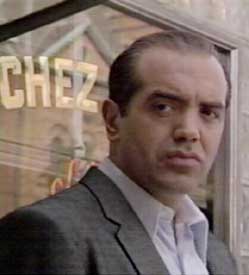Chazz Palminteri wrote the original play & the screen adaptation of A Bronx Tale, & plays one of the leading roles as Sonny, a neighborhood gangster. Robert De Niro directs, & plays the working class stiff Lorenzo Anello, who frets about the charismatic gangster's influence on his son, Calogero "C" Anello.
C is played at age nine Francis Capra & as a teenager by Lillo Brancato. These two young actors look nothing alike, & Capra was so good that when time moves forward & Brancato takes over the character, it was very jarring since their appearance & vocalization are so dissimilar. And it's a problem with any film to get a viewer interested in a young actor's performance then dash that actor out of the film & replace him with someone older. But after a few minutes Brancato successfully claims the role as his & the film is again on track.
There are many iconic moments in the film, & more than a few outright cliches, such as keep setting up an expectation of a standard Hollywood take on Italian American neighborhood tales of gangsters. The cheeziest & most expected treatment of the character array would have been this: a battle for the soul of young C is waged by the "good" father Lorenzo (played by De Niro), & the "bad" but exciting gangster sunny (played by Palminteri), with C to be either corrupted or doomed, unless tragically disillusioned by & repenting of his friendship with the gangster.
But the film is frankly more realistic than that sort of symbolic battle of Good vs Evil. Sonny is a gangster & a murderer & to that degree, a bad man; but he is not without saving graces & he is not evil. He is the product of his environment & the choices he made in his life. When he becomes C's mentor for life in the streets, he does not mean harm. Some of his "lessons" of machievellion gangsterishness are dubious to say the least. Others, such as Sonny's race tolerance, are superior to C's father's stance that the races shouldn't mix.
Lorenzo is certainly a great father with justified worries about his son being taken under a gangster's wing, but he's also motivated by jealousy of the charismatic gangster. So yes, a good man who provides a stable family life for C, but he's no saint.
The thing that is so realistic about this is how C remains fairly centered in the world he lives in. He learns good things from both Sonny & his father, as both men really do have his best interests at heart. Sonny's "do as I say, not as I do" attitude is not corrupting, but if C ultimately emulates his hard-working father instead of the charismatic gangster, it's because his family life & his personal character really are good ones. He is capable of being a part of the full range of neighborhood events without being destroyed by it, without losing his own sense of right.
The element of nostalgia & romance is part of the film, yet it is a universal nostalgia for things of childhood & youth, a memento of everything that shapes a person. This portrait of Italian American life chiefly in the 1960s Bronx shows what was wrong in that time & place, & what was right in that time & place, but it never assumes the worst is inevitable just because it is a temptation & a possibility.
For C, the good & bad are alike things to learn from, things that pull at the heartstrings for all of one's life with memories of youth's loves & adventures & tragedies. Great sadness & great strength are alike a part of life, to enrich us or destroy us in accordance with our own inherent value.
Special mention also has to be made of the soundscape of the film which is not perfect when leaning on golden oldies to telegraph characters -- Sinatra for mafiosa, Hendrix for black kids -- tunes that already mean different things to different people & all too often fail to set the mood De Niro as director may have imagined. But the soundtrack does achieve periodic perfection by the use of acapella doo-wop to symbolize the soul of the Bronx itself.
copyright © by Paghat the Ratgirl
|
